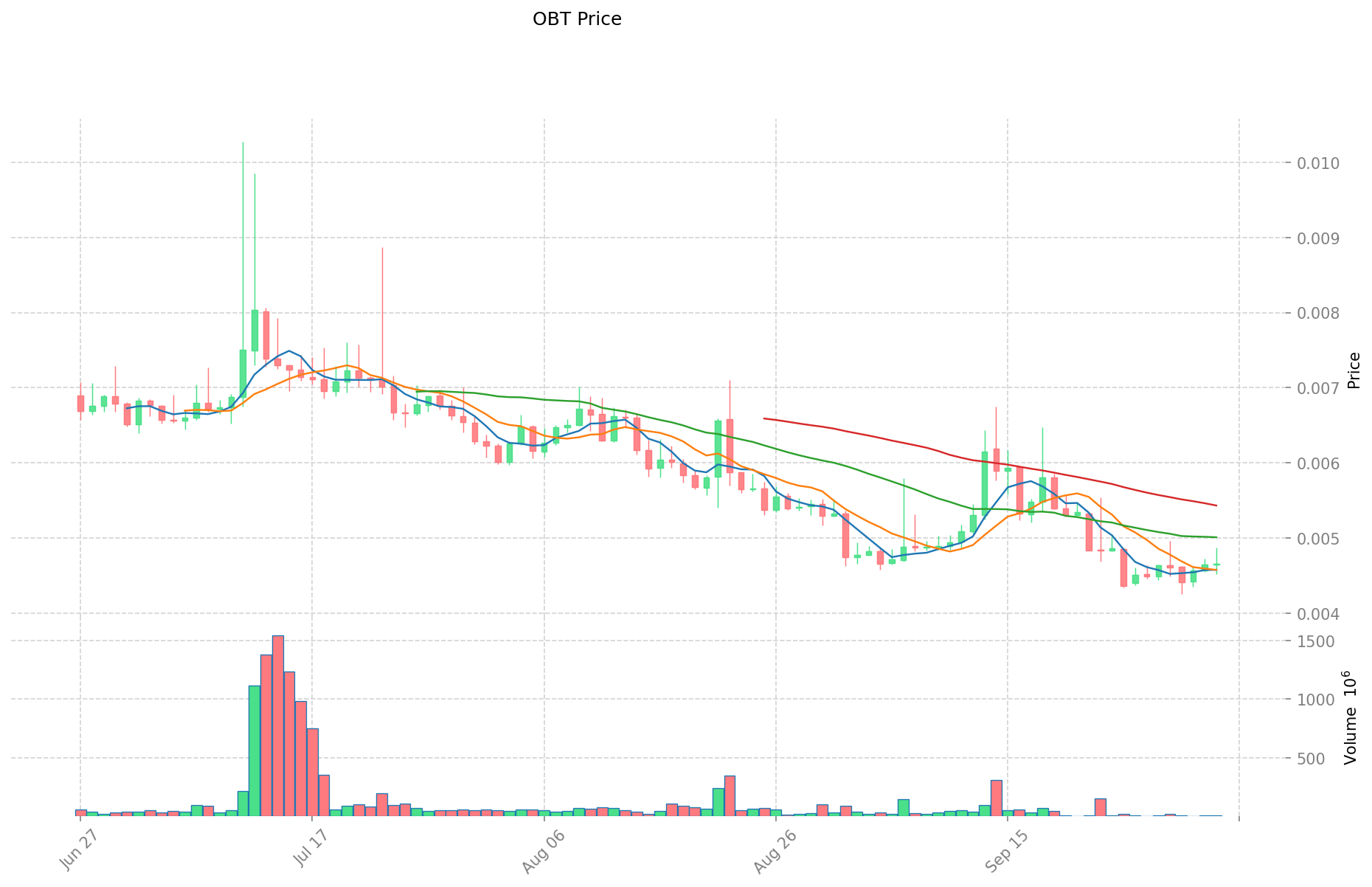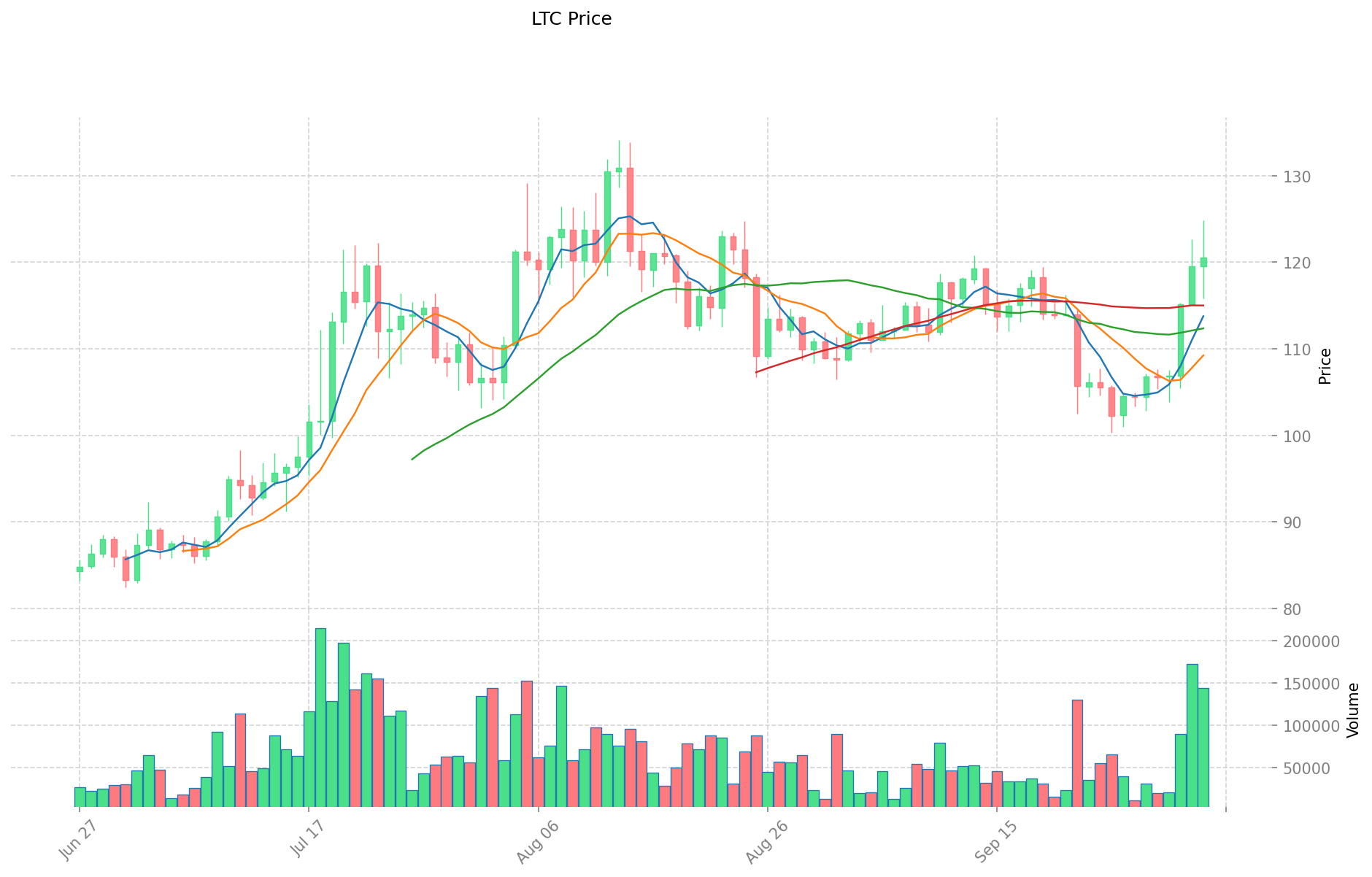OBT vs LTC: Comparing Operational Business Transformation and Long-Term Consistency Strategies in Modern Enterprise Management
Introduction: OBT vs LTC Investment Comparison
In the cryptocurrency market, Orbiter Finance (OBT) vs Litecoin (LTC) comparison has been an unavoidable topic for investors. The two not only differ significantly in market cap ranking, application scenarios, and price performance, but also represent different positions in the crypto asset landscape.
Orbiter Finance (OBT): Since its launch, it has gained market recognition for its interoperability protocol based on ZK technology.
Litecoin (LTC): Introduced in 2011, it has been hailed as the "silver to Bitcoin's gold" and is one of the cryptocurrencies with the highest global trading volume and market capitalization.
This article will comprehensively analyze the investment value comparison between OBT and LTC, focusing on historical price trends, supply mechanisms, institutional adoption, technological ecosystems, and future predictions, attempting to answer the question investors are most concerned about:
"Which is the better buy right now?"
I. Price History Comparison and Current Market Status
OBT and LTC Historical Price Trends
- 2025: OBT reached its all-time high of $0.0335 on March 14, 2025.
- 2025: LTC experienced significant growth, reaching $410.26 on May 10, 2021.
- Comparative analysis: In recent market cycles, OBT has fallen from its high of $0.0335 to a low of $0.004249, while LTC has shown more stability, currently trading at $120.34.
Current Market Situation (2025-10-04)
- OBT current price: $0.004657
- LTC current price: $120.34
- 24-hour trading volume: OBT $24,302.99 vs LTC $17,030,776.19
- Market Sentiment Index (Fear & Greed Index): 71 (Greed)
Click to view real-time prices:
- View OBT current price Market Price
- View LTC current price Market Price


II. Core Factors Affecting the Investment Value of OBT vs LTC
Regulatory Environment and Market Acceptance
- OBT: Government policies and regulations directly impact its market acceptance and value relative to fiat currencies like the USD
- LTC: Regulatory environment similarly affects investor confidence and market growth potential
- 📌 Historical pattern: Clear and supportive regulatory policies enhance investor confidence, promote market growth, and drive value appreciation
Institutional Adoption and Market Applications
- Institutional Holdings: Limited information available on institutional preference between OBT and LTC
- Business Adoption: Both cryptocurrencies' value is influenced by their acceptance in cross-border payments and settlements
- National Policies: Government stance on cryptocurrencies directly affects their market perception and adoption rates
Market Demand and Economic Factors
- Market demand directly influences the relative value of both cryptocurrencies
- Clear regulatory frameworks can strengthen investor confidence in both OBT and LTC
- Long-term value proposition depends on continued market acceptance and practical utility
III. 2025-2030 Price Prediction: OBT vs LTC
Short-term Prediction (2025)
- OBT: Conservative $0.00311751 - $0.004653 | Optimistic $0.004653 - $0.0065142
- LTC: Conservative $92.5617 - $120.21 | Optimistic $120.21 - $165.8898
Mid-term Prediction (2027)
- OBT may enter a growth phase, with estimated price range $0.00345513168 - $0.00857613042
- LTC may enter a bullish market, with estimated price range $159.24314868 - $211.17026238
- Key drivers: Institutional capital inflow, ETF, ecosystem development
Long-term Prediction (2030)
- OBT: Base scenario $0.008610931616859 - $0.012055304263602 | Optimistic scenario $0.012055304263602+
- LTC: Base scenario $224.2641168254025 - $230.992040330164575 | Optimistic scenario $230.992040330164575+
Disclaimer: This analysis is for informational purposes only and should not be considered as financial advice. Cryptocurrency markets are highly volatile and unpredictable. Always conduct your own research before making any investment decisions.
OBT:
| 年份 | 预测最高价 | 预测平均价格 | 预测最低价 | 涨跌幅 |
|---|---|---|---|---|
| 2025 | 0.0065142 | 0.004653 | 0.00311751 | 0 |
| 2026 | 0.006756156 | 0.0055836 | 0.004522716 | 19 |
| 2027 | 0.00857613042 | 0.006169878 | 0.00345513168 | 32 |
| 2028 | 0.0076679243784 | 0.00737300421 | 0.0058246733259 | 58 |
| 2029 | 0.009701398939518 | 0.0075204642942 | 0.006091576078302 | 61 |
| 2030 | 0.012055304263602 | 0.008610931616859 | 0.00792205708751 | 84 |
LTC:
| 年份 | 预测最高价 | 预测平均价格 | 预测最低价 | 涨跌幅 |
|---|---|---|---|---|
| 2025 | 165.8898 | 120.21 | 92.5617 | 0 |
| 2026 | 203.130858 | 143.0499 | 95.843433 | 18 |
| 2027 | 211.17026238 | 173.090379 | 159.24314868 | 43 |
| 2028 | 249.769416897 | 192.13032069 | 176.7598950348 | 59 |
| 2029 | 227.578364857305 | 220.9498687935 | 143.617414715775 | 83 |
| 2030 | 230.992040330164575 | 224.2641168254025 | 168.198087619051875 | 86 |
IV. Investment Strategy Comparison: OBT vs LTC
Long-term vs Short-term Investment Strategy
- OBT: Suitable for investors focused on interoperability and ZK technology potential
- LTC: Suitable for investors seeking stability and potential as a digital payment method
Risk Management and Asset Allocation
- Conservative investors: OBT: 20% vs LTC: 80%
- Aggressive investors: OBT: 40% vs LTC: 60%
- Hedging tools: Stablecoin allocation, options, cross-currency portfolio
V. Potential Risk Comparison
Market Risk
- OBT: Higher volatility, lower liquidity
- LTC: Relatively stable but subject to overall crypto market trends
Technical Risk
- OBT: Scalability, network stability
- LTC: Mining centralization, potential security vulnerabilities
Regulatory Risk
- Global regulatory policies may impact both, with potentially different effects due to their distinct use cases and market positions
VI. Conclusion: Which Is the Better Buy?
📌 Investment Value Summary:
- OBT advantages: Innovative interoperability protocol, potential for growth in cross-chain transactions
- LTC advantages: Established history, wider adoption, relatively stable performance
✅ Investment Advice:
- New investors: Consider a higher allocation to LTC for its established history and relative stability
- Experienced investors: Balanced allocation between OBT and LTC, adjusting based on risk tolerance
- Institutional investors: Evaluate OBT for its innovative technology, while maintaining a significant position in LTC for its established market presence
⚠️ Risk Warning: The cryptocurrency market is highly volatile. This article does not constitute investment advice. None
VII. FAQ
Q1: What are the main differences between OBT and LTC? A: OBT is an interoperability protocol based on ZK technology, while LTC is an established cryptocurrency often referred to as "silver to Bitcoin's gold". OBT is newer and more volatile, while LTC has a longer history and is relatively more stable.
Q2: Which cryptocurrency has shown better price performance recently? A: Based on recent market data, LTC has shown more stability, currently trading at $120.34. OBT has experienced higher volatility, falling from its all-time high of $0.0335 to $0.004657.
Q3: How do the market capitalizations of OBT and LTC compare? A: LTC has a significantly larger market capitalization and trading volume compared to OBT. As of the current data, LTC's 24-hour trading volume is $17,030,776.19, while OBT's is $24,302.99.
Q4: What are the key factors affecting the investment value of OBT and LTC? A: Key factors include regulatory environment, market acceptance, institutional adoption, business applications, market demand, and economic factors. Clear regulatory frameworks and practical utility are crucial for both cryptocurrencies' long-term value.
Q5: What are the price predictions for OBT and LTC in 2030? A: For OBT, the base scenario predicts a range of $0.008610931616859 - $0.012055304263602. For LTC, the base scenario predicts a range of $224.2641168254025 - $230.992040330164575. However, these are speculative and should not be considered as financial advice.
Q6: How should investors allocate their portfolio between OBT and LTC? A: Conservative investors might consider 20% OBT and 80% LTC, while aggressive investors might opt for 40% OBT and 60% LTC. The exact allocation should be based on individual risk tolerance and investment goals.
Q7: What are the main risks associated with investing in OBT and LTC? A: Both face market risks related to overall crypto market trends. OBT has higher volatility and lower liquidity, while LTC faces potential mining centralization issues. Both are subject to regulatory risks, which may impact them differently due to their distinct use cases and market positions.
Share
Content